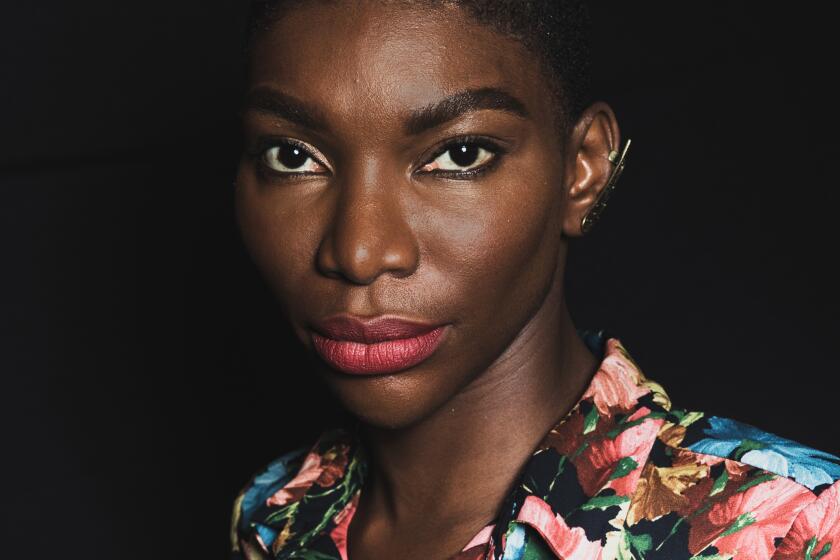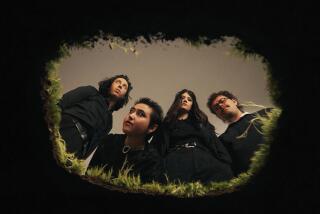The secret weapon behind ‘I May Destroy You’s’ greatness? The coolest music on TV
The first time Ciara Elwis read the script for “I May Destroy You” — the rapturously received HBO series about a young London woman attempting to piece together the murky details of a sexual assault — she immediately took note of what she called a “red flag.”
Elwis had just signed on as the show’s music supervisor, collaborating with its creator and star, Michaela Coel, to select and procure the rights to use the various songs that would make up its soundtrack. The red flag was a pivotal scene in which Coel’s character, Arabella, stumbles out of a bar after having been drugged — or, rather, it was the fact that Coel wanted to set the scene to “It’s Gonna Rain,” a decades-old gospel tune by the Rev. Milton Brunson.
“Straightaway, I knew: OK, right, this is going to have to be approached very carefully,” Elwis said.
Michaela Coel, creator, writer, star and co-director of HBO’s “I May Destroy You,” talks about channeling her personal trauma into the acclaimed HBO series.
In an age of dwindling record sales and fraction-of-a-penny streaming royalties, an offer of cash is often enough to get an artist to license their material. But this case had a moral dimension as well: Elwis wrote a long letter to the song’s rights holders (Brunson died in 1997) explaining what Coel was trying to accomplish in the series, which the actor based on her own painful experience; she even had Coel, who’d spent a portion of her life in the Pentecostal church, add a few personal words to make clear how critical “It’s Gonna Rain” was to the scene.
The song’s owners initially balked. But Elwis, a veteran of challenging British TV shows including “Sex Education” and “The End of the F— World,” persisted in arguing Coel’s case, and eventually they agreed to its use in “I May Destroy You.”

Juxtaposed against Brunson’s crisp choral harmonies, the harrowing scene is unimaginable without the song — just one of the many instances in “I May Destroy You” where music adds surprising emotional depth and valuable cultural texture to Coel’s haunting and remarkably nuanced story.
One sign that its soundtrack — a mix of oldies and current hip-hop, R&B and electronic music — is connecting? Musicians have applauded the show as passionately as critics have. On Instagram recently, Adele called the series “the best thing I’ve seen on British TV for yeaaaarssss” and said it “makes you ask your girls things you haven’t before.”
And Little Simz, a British rapper and singer whose songs have been featured on the show, said, “When certain situations happen in my life, I think, What song would fit this?
“Michaela always gets it on point.”

Produced in conjunction with the BBC, “I May Destroy You,” whose next-to-last episode will be shown Monday night, follows Coel’s breakout 2015 comedy series, “Chewing Gum,” about a sheltered religious girl determined to shed her virginity. But where the earlier show had a bright, cartoonish energy, “I May Destroy You” is darker and more complicated; it examines Arabella’s rape (and its aftermath) from the conflicting viewpoints of each person involved, and not always with the aim of tidying up a messy situation.
The songs help illuminate that tension. Sam Miller, who codirected the series with Coel, said they explicitly avoided “underlining emotion with the music.” Instead, he said, “A lot of the time we’re using music to sort of counter-punctuate — trying to take you away from the emotional thread of the story and keep you on edge.”
As an example, Miller pointed to the end of Episode 2, when one character confronts another who has betrayed her trust. “The music is comic and strange and goofy,” he said, referring to “Nightmares,” a bouncy, horn-laced cut by English alt-pop group Easy Life. “There’s nothing portentous or sad about it.”

Asked to explain the effect of that choice, Miller said, “It upsets you a little bit; it makes you work harder to read the emotion” — apt for a show filled with competing interpretations of a climactic event.
Another striking moment comes in a warm flashback when Arabella and a new lover watch the sun rise over an Italian beach as the guy plays Daft Punk’s “Something About Us” from his phone. The electronic duo’s tender 2001 track isn’t jarring in a tonal sense, but it’s sung in a computerized robot voice; the unexpected selection provides a different feeling than, say, a sentimental Ed Sheeran ballad would have (and it nods to the constant presence of screens and smartphones in “I May Destroy You”).
As with “It’s Gonna Rain,” Coel wrote the Daft Punk song into the show’s script, which for Elwis raised another worry. She’d tried with no success to license music by the enigmatic French act for other shows. “So the first thing I said was, ‘Well, I’ve never managed to clear them before, but we’ll do what we can,’” she recalled telling Coel.
Elwis sent the duo rough cuts of several early episodes — something she doesn’t often do, she said — in the hope that the show’s smart writing and unique look would convince them to take part. “And obviously the money needed to be not insulting,” she added with a laugh. “But with Daft Punk it was always going to be a yes or no [based on their reaction to the material] rather than anything to do with the fee level,” she said.
One reason the songs make such an impact in “I May Destroy You” is because Coel went without a traditional score, a decision Miller framed as a means of denying themselves “a crutch” that filmmakers too often rely on to do what the action onscreen should. But that also opened up space to use loads of preexisting music in what he called a “tangential” way — including dozens of tracks by up-and-coming British artists (such as Ramz, Paigey Cakey and Arlo Parks) that casually enrich the show’s representation of a modern, proudly diverse London.
In that sense, “I May Destroy You” can recall Issa Rae’s HBO series “Insecure,” which uses cutting-edge R&B to evoke a Black Los Angeles not always seen on prestige television. Amy Gravitt, HBO’s executive vice president of programming, called music a storytelling tool “that helps the audience escape into the world of a series” and said it’s “yet another way that Issa and Michaela reinforce the tone of their shows.”
The right song also can allow the viewer into a character’s soul: To watch Arabella perform Nicki Minaj’s “Truffle Butter” at karaoke, as she does with enormous flair in “I May Destroy You’s” pilot, is to understand as much about her as any look or line of dialogue could provide.
Here in our world, Coel’s show is playing an effective music-discovery role, particularly for those U.K. up-and-comers at a moment when American pop radio is in its least Anglophilic mode in years. Little Simz, for one, said people hit her up on social media “all the time” to say they were introduced to her through “I May Destroy You.” (As it does for “Insecure,” HBO maintains an exhaustive Spotify playlist of music heard on the show.)
Elwis, who grew up in Scotland watching “The O.C.” and “Gossip Girl,” relishes the thought. “When I was at school I had all these scuzzy Brooklyn bands on my — what would it have been? — my iPod,” she recalled of the acts featured on those influential teen soaps.
“Maybe that’s what ‘I May Destroy You’ does for London.”
More to Read
The biggest entertainment stories
Get our big stories about Hollywood, film, television, music, arts, culture and more right in your inbox as soon as they publish.
You may occasionally receive promotional content from the Los Angeles Times.












